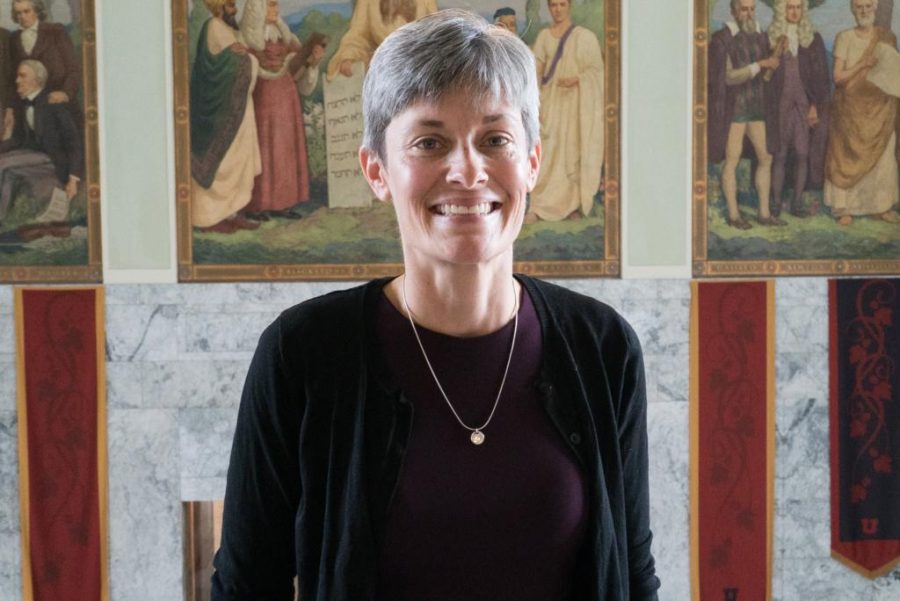Amy Wildermuth, associate vice president for faculty and chief sustainability officer at the University of Utah, has served as a leader throughout her years of work in law, engineering and sustainability. Wildermuth’s involvement in the U’s recently announced renewable energy contract is yet another accomplishment that represents her constant drive to improve her community.
Wildermuth graduated with a master’s degree in engineering and a juris doctorate from the University of Illinois. At the time, she expected to become an attorney in Chicago, her hometown. She said she never would have expected to end up where she is today — in Utah.
When Wildermuth received an opportunity to complete a series of high-profile judicial clerkships in New York and Washington D.C., new opportunities opened up for her. Wildermuth said that it was a “life-changing experience” to work with United States Appeals Court Judges Harry Edwards and Guido Calabresi, and later with Supreme Court Justice John Stevens.
While clerking in New York, one of Wildermuth’s former law professors asked her to fill in for him at the University of Illinois for a year. She took the job, and she said it was the moment she discovered her love for teaching.
Shortly after, Wildermuth moved to Utah to support her now-wife, Gwen Foster, in her professional snowboarding career. She found a job as a professor at the S.J. Quinney College of Law, and her career at the U began.
Before taking the job, however, Wildermuth had one requirement for U President David Pershing — she wanted health insurance for both her and her wife, an unprecedented request. At the time, no same-sex couple had ever asked for health insurance at the U, but she said her request was gladly met.
Wildermuth gradually rose through the ranks to become Associate Vice President of Faculty at the U. She said this position has enabled her to give input and work on special projects around the U.
One topic she has been particularly focused on is sustainability.
“You get an opportunity every once in a while to run new ideas and to say, ‘Here’s something across the university that I’m hearing we need to do something about, and I want to be apart of it,’” Wildermuth said. “That’s what happened with sustainability.”
As the AVP, Wildermuth was able to help build the U’s Sustainability Office and shift its focus from a “global impact” to a more local approach. An important change made, she said, was moving the office into Academic Affairs, where the office would have more power and connection to campus.
This meant that someone needed to fill the new role of chief sustainability officer and Wildermuth stepped up.
“Sustainability is my joy,” she said. “I have a real passion for it.”
In this position, Wildermuth helps to facilitate big changes while working together with deputy chief sustainability officer Myron Willson, who handles day-to-day operations. One of the first topics they discussed was divestment from fossil fuels. Wildermuth said they quickly determined they wanted to focus on reducing the U’s investment in fossil fuels — that’s how the renewable energy contract was born.
“We wanted to make a meaningful change and show the university and community who we are by fully committing to our goal of carbon neutrality,” Wildermuth said.
When the U pledged to become 100 percent carbon neutral by the year 2050, the Sustainability Office started to look for ways to reduce emissions.
Wildermuth began research on renewable energy solutions for the U and found that geothermal energy was a practical option to explore. A long-term deal was placed on the table despite costing modestly more than other energy alternatives. Overall, Wildermuth and her team felt it was a more stable resource for the campus.
A plan was drafted that combined geothermal energy with solar power. Many were skeptical of the plan because geothermal power is generally perceived as costly. The key, Wildermuth said, was persistence and determination.
“This was one thing we felt was really critical to the university,” she said. “We needed to do this.”
The next step is to go before the state’s Public Service Commission and propose the plan. If it is successful, the U would become the first public entity in Utah to potentially qualify for the green tariff, which would allow it to sell excess renewable energy.
Wildermuth said this is just one of many accomplishments to come from the Sustainability Office and she is looking forward to seeing more innovative projects in the future. One idea the office is beginning to explore is an “intermodal transportation hub,” which would streamline how people get to and around campus.
Although Wildermuth has had a significant impact not only at the U but throughout her career, she admitted that the road has not always been easy. She said that working in male-dominated fields was sometimes difficult.
“At many times, I was the only woman in the room,” Wildermuth said.
Despite this, she has always kept a positive attitude and said that she doesn’t let criticism or skeptics get the best of her.
“I come to work every day happy and I start each day brand new,” she said.
Wildermuth encouraged students to do the same.
“Start every day brand new,” Wildermuth said. “Don’t carry negativity with you, and always be persistent.”


